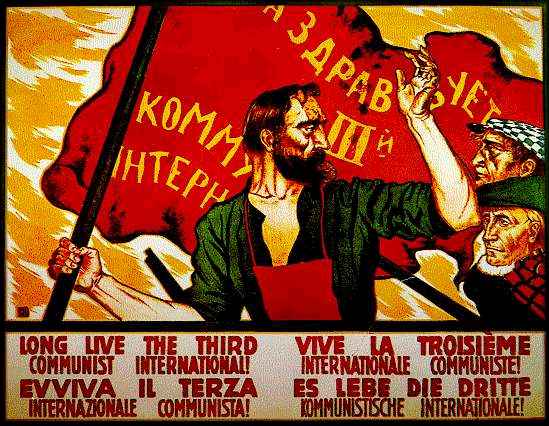Soon after the
Russian revolution, the Communist International (also known as the Third International
or Comintern) was formed for promoting revolutions on an international
scale.
 |
- The
left-wing sections in many socialist parties now formed themselves into
communist parties and they affiliated themselves to the Comintern.
- Communist
parties were also formed in other countries, often with the active involvement
and support of the Comintern.
- Thus
the international communist movement arose under one organization which
decided on policies to be followed by all communist parties
- The
Soviet Union was considered the leader of the world communist movement by
the communist parties in various countries and the Communist Party of
Soviet Union played a leading role in determining the policies of the
Comintern.
- It
is generally agreed that Comintern was often used by the Soviet Union as
an instrument for pursuing its own objectives.
- However,
the formation of communist parties in many countries of the world with the
objective of bringing about revolution and following common policies was a
major consequence of the Russian Revolution.
 |
With
the formation of the Comintern, the socialist movement was divided into two
sections — socialist and communist.
There were many
differences between them on the methods of bringing about socialism and about
the concept of socialism itself. Despite these differences, socialism became
one of the most widely held ideologies within a few decades after its
emergence. The spread of the influence of socialist ideas and movements after
the First World War was in no small measure due to the success of the Russian
Revolution.
The growing popularity
of socialism and many achievements made by the Soviet Union led to a
redefinition of democracy. Most people
who did not believe in socialism also began to recognize that for democracy to
be real, political rights without social and economic rights were not enough. Economic and social affairs could not
be left to the capitalists. The idea of the state playing an active role in
regulating the economy and planning the economy to improve the conditions of
the people was accepted.
The biblical idea,
revived by the socialist movement and the Russian Revolution, ‘He that does not work neither shall he
eat’, gained widespread acceptance, adding a new dignity to labour. The
popularity of socialism also helped to mitigate discriminations based on race,
colour and sex.
The
spread of socialist ideas also helped nip promoting internationalism. The nations, at least in theory, began
to accept the idea that their relations with other nations should go farther
than merely promoting their narrow self-interests. Many problems which were
considered national began to be looked upon as concerns of the world as a
whole. The universality and internationalism which were fundamental principles
of socialist ideology from the beginning were totally opposed to
imperialism.
The Russian
Revolution served to hasten the end of imperialism. According to Marx, a nation
which enslaves another nation can never be free. Socialists all over the world
organized campaigns for putting an end to imperialism.
The new Soviet state
came to be looked upon as a friend of the peoples of the colonies struggling
for national independence. Russia after the Revolution was the first country in
Europe to openly support the cause of independence of all nations from foreign
rule. Immediately after the Revolution, the Soviet government had annulled the
unequal treaties which the Czar had imposed on China. It also gave assistance
of various kinds to Sun Yat Sen in his struggle for the unification of China.
The Russian
Revolution also influenced the movements for independence in so far as the
latter gradually broadened the objectives of independence to include social and
economic equality through planned economic development.
Writing about the
Russian Revolution in his Autobiography, Jawaharlal Nehru said, “It made me think of politics much more in terms of social
change.”

